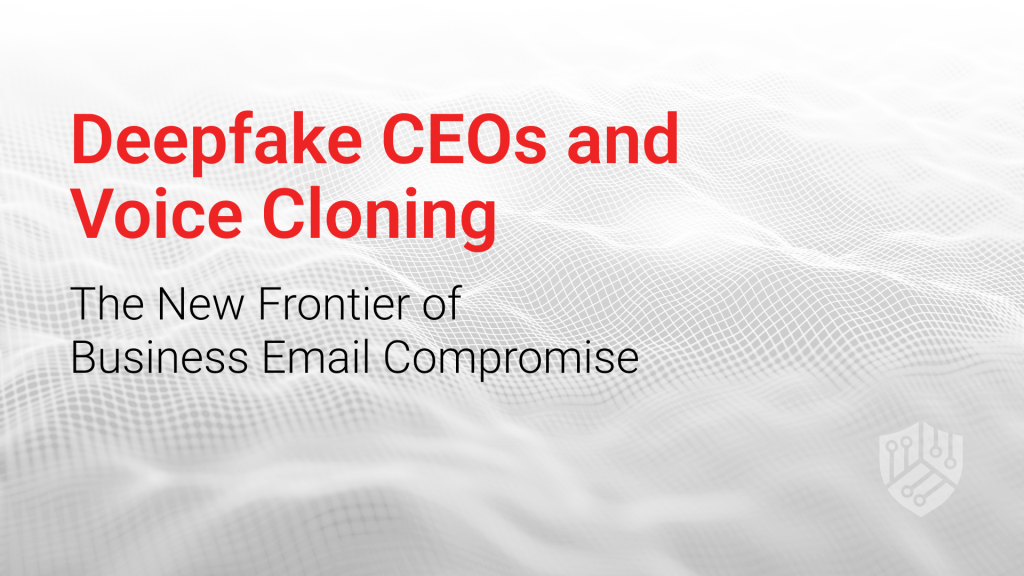September 19, 2025
Deepfake CEOs and Voice Cloning: The New Frontier of Business Email Compromise

The voice on the phone sounded exactly like your CEO—same tone, same mannerisms, even the same slight accent. But it wasn’t. What you just experienced was a sophisticated deepfake scam. The CyberFlow cybersecurity team warns that this is the latest and most dangerous evolution in business email compromise we’ve seen to date.
Until now, traditional CEO fraud attacks relied on simple email spoofing and social engineering tactics. Today’s cybercriminals have access to artificial intelligence tools that can perfectly:
- replicate voices
- create convincing video calls
- craft personalised attacks.
These tactics are so refined that even security-aware employees struggle to detect.
The Alarming Rise of AI-Powered Deepfake Scams
Recent statistics paint a concerning picture of this emerging threat landscape:
- 400% increase in deepfake scams reported in 2024 compared to 2023
- Average financial loss per successful voice cloning attack: $243,000
- Success rate of deepfake-assisted social engineering attacks: 68%
- Time required to clone a voice from publicly available audio: Less than 3 minutes
These numbers aren’t just statistics—they represent real businesses facing devastating financial losses and reputational damage.
How Modern Deepfake Attacks Target Your Business
The new attack methods are three-pronged:
1. Voice Cloning Attacks
Cybercriminals harvest audio from your executives’ public appearances, earnings calls, or social media videos. Using readily available AI tools, they create convincing voice clones that can fool even close colleagues during phone calls requesting urgent wire transfers or sensitive information.
2. Video Conference Impersonation
Advanced deepfake scams now include real-time video manipulation during virtual meetings. Attackers can impersonate executives during supposedly confidential video calls, making urgent requests that bypass normal approval processes.
3. Enhanced Email Attacks
Traditional business email compromise attacks are now supplemented with AI-generated content that perfectly mimics executive writing styles, making fraudulent requests nearly indistinguishable from legitimate communications.
The Psychology Behind Successful CEO Fraud Attacks
Cybercriminals know how to exploit human psychology. They employ:
- Authority Pressure: Employees naturally hesitate to question direct requests from senior leadership, especially when framed as urgent or confidential matters.
- Time Constraints: Attackers deliberately create artificial urgency, pressuring victims to act quickly without following standard verification procedures.
- Emotional Manipulation: Modern social engineering attacks exploit trust relationships and company loyalty, making employees feel personally responsible for helping their “CEO” in a critical situation.
3-Step Approach to Preventing Business Email Compromise
- Implement Multi-Channel Verification
- Establish mandatory verification protocols for all financial requests
- Require confirmation through at least two different communication channels
- Never approve large transactions based solely on email or phone requests
- Create code words or security questions that only genuine executives would know
- Strengthen Your Human Firewall
- Conduct regular awareness training specifically covering deepfake scams
- Share real examples of attempted attacks with your team
- Encourage employees to trust their instincts when something feels “off”
- Create a culture where questioning authority figures is acceptable and expected
- Create Robust Response Procedures
- Develop clear escalation procedures for suspicious requests
- Establish incident response protocols for suspected deepfake attacks
- Train team members on how to verify executive identities
- Document and analyse attempted attacks to improve future prevention
Red Flags That Signal Potential Deepfake Scams
Stay alert for these warning signs:
- Unusual urgency in requests for money transfers or sensitive information
- Requests to bypass established approval processes or security protocols
- Communication outside normal business hours or channels
- Slight audio quality issues during phone calls or video conferences
- Uncharacteristic language or phrasing in written communications
- Pressure to keep requests confidential from other team members
The Business Impact of Successful Attacks
The consequences of falling victim to sophisticated deepfake scams extend far beyond immediate financial losses:
- Financial Damage: Direct monetary losses from fraudulent transfers, plus costs associated with incident response, legal proceedings, and regulatory compliance.
- Reputational Harm: Public disclosure of successful attacks can damage client trust and competitive positioning in the marketplace.
- Operational Disruption: Recovery efforts can significantly impact business operations, affecting productivity and customer service delivery.
- Regulatory Consequences: Depending on your industry, successful attacks may trigger regulatory investigations and potential compliance violations.
Secure Your Business Against Tomorrow’s Threats with CyberFlow!
Don’t wait for a successful attack to expose vulnerabilities in your defences. The sophistication of modern deepfake scams demands equally sophisticated protection strategies.
CyberFlow uses advanced solutions to protect against advanced cyber threats, including deepfake attacks, social engineering schemes, and business email compromise. Our expert team combines cutting-edge technology with proven security methodologies to safeguard your company’s most valuable assets.
Contact us today to keep your business secure in an increasingly dangerous digital world!
About Us
If you are interested on apply more security to your business contact us
